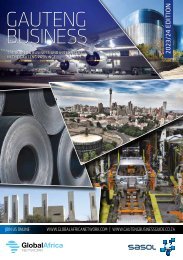Opportunity Issue 104
Opportunity magazine is a niche business-to-business publication that explores various investment opportunities within Southern Africa’s economic sectors. The publication is endorsed by the South African Chamber of Commerce and Industry (SACCI).
Opportunity magazine is a niche business-to-business publication that explores various investment opportunities within Southern Africa’s economic sectors. The publication is endorsed by the South African Chamber of Commerce and Industry (SACCI).
You also want an ePaper? Increase the reach of your titles
YUMPU automatically turns print PDFs into web optimized ePapers that Google loves.
EFFICIENCY IN MINING<br />
Northam Platinum scores<br />
environmental wins as it increases<br />
output and improves efficiency<br />
Unique and innovative systems help the group expand<br />
production and go greener at the same time.<br />
Northam Platinum’s expansion project at its<br />
Metallurgical Complex has successfully combined<br />
increased output and greater efficiency with<br />
improved environmental outcomes.<br />
Northam Platinum is a major producer of<br />
Platinum Group Metals (PGMs) and Base Metals. These include<br />
platinum, palladium, rhodium, gold, ruthenium and iridium. Base-<br />
Metals such as copper and nickel are also produced. The PGM<br />
concentrate is further refined through a Precious Metal Refinery<br />
(PMR) to produce marketable products.<br />
Improvements were introduced in terms of slag handling at<br />
the PGM Furnaces where an innovative new process has broken<br />
successfully with conventional PGM slag handling practices.<br />
Part of the broader expansion project was to align the Base Metal<br />
Removal Plant (BMRP) to the expansion of capacity at the Processing<br />
Plant. The focus here was on the optimisation of the current plant.<br />
In July 2021, the BMRP began to implement the first phase<br />
of its expansion and debottlenecking project to address the<br />
strategic production growth within the Northam Group. Among<br />
the innovations used in the process was the installation of a<br />
chilling circuit to enhance the process, which is unique to the<br />
Zondereinde Refinery.<br />
Slag handling at the PGM Furnace<br />
Furnace slag across the PGM industry has historically been handled<br />
in what is commonly known as a wet granulation process, which<br />
involves molten slag being quenched in a launder containing<br />
rapidly flowing water. The quenched slag forms granules<br />
which is then transported through various means.<br />
The water used during this process is circulated through<br />
an array of ponds and cooling towers, then reused. Reusing<br />
this water minimises the environmental impact but this<br />
process does have significant water losses due to the steam<br />
that is generated.<br />
In a departure from the PGM industry standard, the Smelter<br />
at Northam Platinum’s Zondereinde operation has taken a leap<br />
into the future by completely changing the way furnace slag<br />
is handled.<br />
During December 2020, after months of planning and<br />
preparation, the granulation system at one of Northam’s<br />
Furnaces was demolished and replaced by built-for-purpose<br />
slag bays.<br />
In a PGM-industry first, molten slag is now deposited<br />
straight into slag bays where it is allowed to cool. Once cooled<br />
it is broken by means of Trackless-Mobile Machinery (TMM)<br />
and transported to the slag stockpiles.<br />
Among the benefits realised through this ground-breaking<br />
innovation is a major reduction in the risk involved in the<br />
slag-tapping and slag-handling processes. The exposure to<br />
water in excess of 70 °C has been completely eliminated and<br />
the frequency of opening and closing of tap holes has been<br />
reduced significantly. Notably, 80% of the injury incidents in<br />
the Smelter were related to this hot water.<br />
A system that continually circulated 800m3 of water through<br />
an intricate system of tanks, pumps, pipes and launders with<br />
all the relevant wear, breakdowns and maintenance was<br />
effectively made obsolete overnight, resulting in a 1 MW<br />
power saving.<br />
A major constraint of the wet granulation system is the fact<br />
that there is a maximum tapping rate which inhibits the use<br />
of slag tapholes during emergency events. The new process<br />
allows the flexibility to run both slag tapholes simultaneously<br />
for extended periods if the need should arise.<br />
The biggest benefit has been the de-coupling of the<br />
Furnace from the slag handling which was the single largest<br />
28 | www.opportunityonline.co.za


















